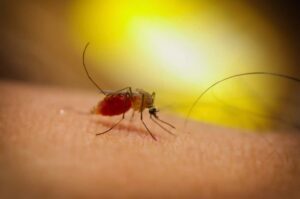Pregnancy and Malaria
During pregnancy the risks of contracting malaria are greater, and a malaria infection can cause complications during the pregnancy to mother and the baby.

Many travellers when first pregnant often celebrate with a holiday in anticipation of the possible restrictions to travel that a young child can bring. With the attraction of sustained warm weather many countries abroad are favoured as a destination. Some of these countries are in areas where there is the malaria vector mosquito Anopheles.
The countries and provinces at risk of malaria are published annually in the UKHSA Guidelines for Malaria Prevention in travellers from the UK.
The levels and areas of risk apply to the average traveller; however, when pregnant the risks of contracting malaria are greater, and a malaria infection can cause complications during the pregnancy to mother and the baby. Clinically the risks greater levels of the parasite are found in pregnant women, that can lead to severe anaemia and profound low blood sugar levels. If the parasites cross the placenta then they can induce an abruption, premature labour or a miscarriage.
So, with an increased risk of contracting malaria what are the options for a pregnant traveller.
- Consider travelling to a non-malarial area or delay travel until after pregnancy.
- Sleep under a mosquito net that is tucked under the mattress.
- If available turn on a fan and lower air-conditioning temperature.
- Use anti-malarials following the advice of a travel health specialist.
- Increase the use of the bite avoidance measures, especially at night by using insect repellents containing one of the following:
- DEET
- Picardin/icaridin
- Oil of lemon eucalyptus
Antimalarial preparations and pregnancy
Contrary to popular belief some anti-malarial preparations can be considered for use in pregnancy. At CityDoc trained nurses and pharmacists have access to supply for either mefloquine or doxycycline which can be considered for use in pregnancy depending at which trimester the travel occurs.
The use of doxycycline in the first trimester is now internationally recognised for its benefits as an antimalarial, whereas mefloquine has a better safety profile in the second and third trimesters. Further details can be found here.
Don’t forget- that malaria is not alone as an infection spread by mosquito the daytime feeding species can transmit dengue, chikungunya and zika and your risk assessment with a travel health specialist can advise on protection against these infections.
So when considering travel whilst pregnant it is important to realise and understand the increased levels of risk associated with mosquito borne infections. In addition to these risks are those from the associated vaccinable diseases and emergency obstetric services should they be required.
Written by Derek Evans FFTM RCPS(Glasgow), FISTM, FRPharmS, FRGS
Travel Health and Vaccination Lead



